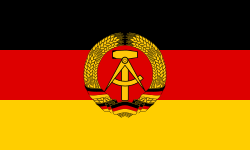Division of Germany
After the division of Germany following World War II, three separate states had been founded under occupation. After the Allies denied attempts made in 1947 to continue the participation of Germany at the Olympics, no German team could participate in the 1948 games. Finally, in 1949, the National Olympic Committee for Germany was founded in the Western Federal Republic of Germany. This was later recognized by the IOC as representing both German states. The small French-occupied Saarland and its NOC (SAA) joined the Federal Republic of Germany after 1955, having not been allowed to join the German counterparts previously.
The East German Nationales Olympisches Komitee für Ostdeutschland authority refused to send their athletes to the 1952 games as participants of an all-German team, demanding a team of their own. This was denied by the IOC.
Success of East Germans
The socialist GDR erected the Berlin Wall in 1961, during the Cold War. They renamed their NOC to Nationales Olympisches Komitee der DDR in 1965. It was recognized as an independent NOC by the IOC in 1968. Following this, the GDR ceased participation in the United German team and sent a separate East German team from 1968 to 1988, other than absences in the summer of 1984 in being part of the Soviet-led boycott of the 1984 Summer Olympics.
While the GDR, a small state with a population of about 16 million, has a short history, and even a shorter history at the Olympics, it was extremely successful. From 1976 to 1988, it came second in all three of their summer Olympics, behind the Soviet Union, but well ahead of larger West Germany. This was improved upon at five winter games, with 4 second-place rankings and a first in the 1984 Winter Olympics.
It is widely believed that doping (predominantly anabolic steroids) allowed East Germany, with its small population, to become a world leader in the following two decades. It won a large number of Olympic and world gold medals and records. A number of athletes subsequently failed doping tests and others were suspected of taking performance-enhancing drugs. [1] [2] However, in many cases where suspicions existed, no proof of wrongdoing was uncovered. As a result, the majority of records and medals won by East German athletes still stand. Aside from an extensive doping programme, East Germany invested significantly in sport, particularly in Olympic sports. It had an extensive state bureaucracy to select and train promising athletes and world-class coaches.
An important figure in the GDR was Manfred Ewald (1926–2002), member of SED central committee from 1963. He was president of the "Staatliches Komitee für Körperkultur und Sport" (Stako) from 1952 to 1960. In 1961, he became president of the "Deutscher Turn- und Sportbund" (DTSB), governing all sport in the GDR, and in 1973 president of the NOC. He is considered to be the organiser of the "GDR sports miracle". His post-1990 autobiography was titled "I was the Sport". He fell from grace in 1988, having been removed from the office of DTSB. In 2001, he was found guilty of doping.
Germany reunited
The German Democratic Republic ceased to exist in 1990, joining the West into a reunified Germany in the process of German reunification. Accordingly, the "NOC of the GDR" joined the "NOC of Germany" on 17 November 1990. German athletes competed at the Olympic Games as a single team again from 1992 onwards. Athletes from the Eastern part of Germany contributed disproportionately to the medals won by Germany, particularly in the first decade after reunification. This is thought to indicate that doping was not the only reason East Germany was so successful (and more successful than West Germany in particular) in the Olympics, with professional training conditions also being significant. The medal tally of reunited Germany after 1990 was more comparable to that of East Germany before 1990 than of West Germany before 1990. For example, of the twenty nine medals Germany won in the 2006 Winter Olympics East German born (containing one-fifth of the population of Germany) athletes won fourteen (six gold). West German athletes won only nine medals (three gold), with six medals won in mixed teams. In recent years, some centres of German top-class sport have relocated to the West, for example winter sports to Bavaria. However, the East is still performing better than the West. Trainers from East Germany (e.g. Uwe Müßiggang) were important in producing sporting success for United Germany. Also, many top-class German athletes who today live in the western part of Germany started their professional sport careers in the East, and can be seen as part of the large-scale exodus of young people from the East to the West since reunification.
